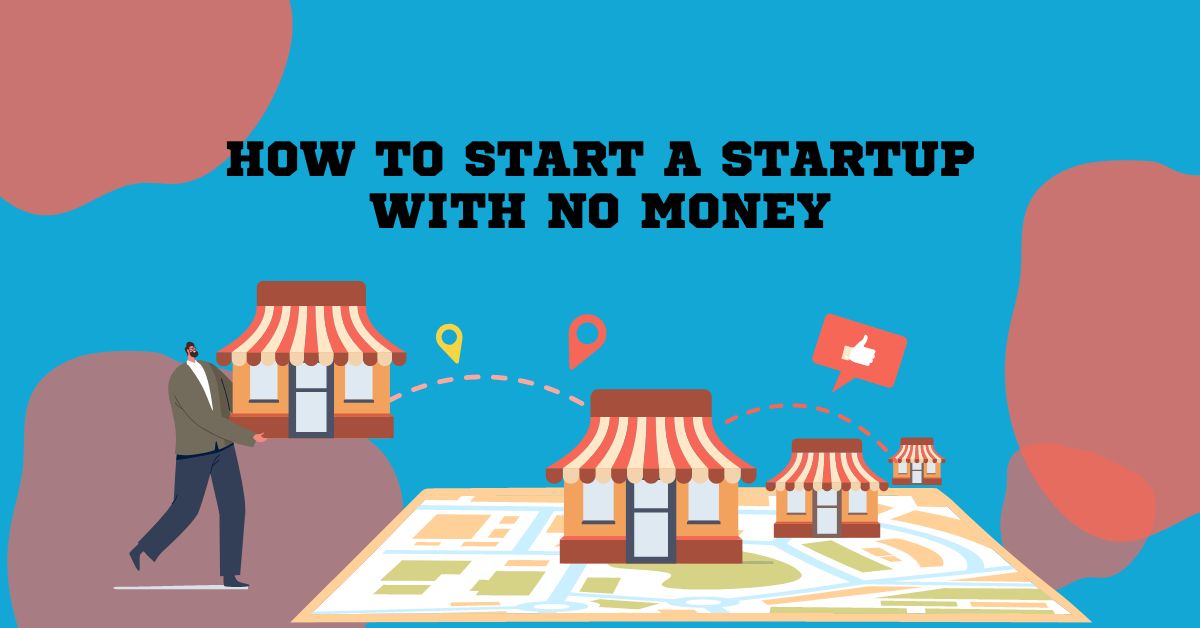Imagine standing at the foot of a mountain, gazing upwards at the towering peak. That’s what starting a startup with no money can feel like. But just as every mountain is climbed one step at a time, building a startup from scratch is a journey of persistence, creativity, and intelligent strategies. This guide will teach you how to start a startup with no money, equipping you with the know-how to make your business dreams a reality. So let’s embark on this exciting entrepreneurial adventure together.

The Challenges and Opportunities of Starting a Business Without Money
Starting a business without a significant financial cushion can be daunting. Challenges are around every corner, from developing your product to attracting customers. But where there are challenges, there are also opportunities. Bootstrapping a startup can teach valuable resourcefulness, resilience, and adaptability lessons. In addition, it can foster innovation as you seek cost-effective ways to operate and compete.
Preliminary Steps for Creating a Startup

Validating Your Startup Idea: Ensuring Market Demand
Validating your business idea is crucial before investing time and effort into your startup. Conduct market research to understand your target audience, their needs, and whether your product or service meets these needs. Tools like Google Trends, social media, and customer surveys can offer valuable insights.
Identifying Your Core Purpose and Building a Business Model Around It
Identify what drives you and how your business can create value. Having a clear purpose behind your startup can guide its growth. You can build a business model once you’ve defined your core purpose. This model should outline how your startup creates, delivers, and captures value.
The Importance of a Strong Founding Team in Building a Startup from Scratch
The right founding team can make all the difference when you’re learning how to build a startup from scratch. Look for individuals who share your vision and bring diverse skills. A strong team can enhance problem-solving, decision-making, and resilience in facing challenges.
Strategies for Starting a Company with No Money
Leveraging No-Code Tools to Build Your MVP: A Cost-Effective Approach
One of the first steps in launching a startup is building a minimum viable product (MVP) – a basic version of your product that solves the problem. No-code tools like Bubble, Adalo, or Webflow can help you create your MVP without expensive coding expertise, saving on upfront costs.
Attracting a Skilled Founding Team Willing to Work for Equity
When cash is scarce, equity can be a powerful incentive, attracting co-founders and early employees willing to work for equity can help you build your startup without a large payroll; leveraging financial equity reporting software can ensure transparency about the risks and potential rewards of building a team committed for the long haul
Pay-Per-Conversion Marketing: An Affordable Approach for Startups
Marketing can be a significant expense for startups. However, pay-per-conversion advertising, where you pay only when someone takes a desired action, can be a more affordable option. By incorporating a PPC management strategy, platforms like Google Ads and Facebook Ads offer pay-per-conversion options, allowing you to optimize your marketing budget.
How to Make a Startup Stand Out without a Large Marketing Budget
You don’t need a large marketing budget to make your startup stand out. Content marketing, social media engagement, and influencer collaborations can be cost-effective ways to build your brand. Also, consider leveraging public relations by pitching your unique story to media outlets.
Building a Strong Online Presence

The Power of Social Media in Startup Growth
Social media can be a powerful tool in your startup’s growth strategy. It can help you build brand awareness, engage with your audience, and drive traffic to your website. Platforms like Facebook, Twitter, Instagram, and LinkedIn offer various ways to connect with your target audience.
he Power of Social Media in Startup Growth Social media can be a powerful tool in your startup’s growth strategy. It can help you build brand awareness, engage with your audience, and drive traffic to your website. Platforms like Facebook, Twitter, Instagram, and LinkedIn offer various ways to connect with your target audience.
Additionally, using services like Printful enables startups to easily create and sell custom t-shirts online, achieving quick turnaround times without the need for significant upfront investment. Creating and Maintaining an Engaging Website and Blog Your website is your online storefront. Make it engaging and user-friendly to make a positive first impression.
Creating and Maintaining an Engaging Website and Blog
Your website is your online storefront. Make it engaging and user-friendly to make a positive first impression. Maintaining a blog can also drive traffic to your website, improve SEO, and position your startup as an industry expert. In addition, platforms like WordPress and Wix offer cost-effective ways to build and maintain a website.
Importance of SEO and Content Marketing for Startups
SEO and content marketing are crucial for increasing online visibility. By optimizing your website and creating valuable content, you can attract organic traffic from search engines. This is a cost-effective way to reach your target audience and build credibility.
If you are not especially savvy in this department, you can always seek out help from a marketing company that provides SEO consulting services.
Collaboration and Networking in the Startup World
Collaborating with Established Brands to Gain Credibility and Exposure
Collaborations can be a win-win for startups and established brands. Startups can gain credibility, exposure, and access to a larger audience. In return, established brands can innovate and connect with a younger audience. Look for brands that share your target audience and values.
Importance of Networking for Startups: Finding Mentors, Partners, and Investors
Networking can open doors to mentors, partners, and investors. Attend industry events, join online forums, and leverage social media to connect with like-minded individuals. Mentors can provide valuable advice, partners can offer resources and collaboration opportunities, and investors can offer funding. Make sure to create a pitch deck to effectively communicate your business to others.
Building Customer Relationships

Making Every Customer Feel Special: The Power of Exceptional Customer Service
Exceptional customer service can differentiate your startup in a crowded market. Make every customer feel special by being responsive, empathetic, and proactive. In addition, customer service can resolve issues and turn customers into loyal advocates.
Implementing Customer Retention Strategies in Your Startup Business
Acquiring a new customer can be five times more expensive than retaining an existing one. So implement customer retention strategies like personalized communication, loyalty programs, and regular feedback collection to keep your customers returning.
Competitive Analysis and Market Understanding

Keeping an Eye on Your Competitors: Understanding Market Trends and Dynamics
Understanding your competitors can offer valuable insights. Regularly monitor their activities to understand market trends and dynamics. Use tools like Google Alerts, SEMrush, and social media to keep an eye on your competitors.
Utilizing Competitive Insights to Your Advantage
Competitive insights can inform your business strategy. First, identify your competitors’ strengths and weaknesses and how you can differentiate your startup. For example, you may offer better customer service, a unique feature, or a more affordable price.
Utilizing Tools and Resources for Startup Growth
Making the Most of Free and Low-Cost Tools for Startups
In today’s startup world, efficiency is the key to success, and the right tools can be a game-changer. Numerous free and low-cost tools are available that can significantly streamline your operations. For example, Google Workspace aids collaboration, Mailchimp simplifies email marketing, Canva is a godsend for design, and Trello keeps your project management on track.
And, of course, we must recognize the role of OneThread, a versatile project management tool. It’s intuitive, efficient, and packed with powerful features, making it a must-have for startups on a budget.
Resources for Learning and Growth: Online Courses, Webinars, and Podcasts
Continuous learning is crucial for startup success. Online courses, webinars, and podcasts can offer valuable insights and skills. Platforms like Coursera, Udemy, and LinkedIn Learning offer courses on various topics, while podcasts like “How I Built This” and “Startup” share inspiring entrepreneurial stories.
Embracing the Entrepreneurial Mindset
How to be an Entrepreneur without Money: Mindset and Skills
Being an entrepreneur isn’t just about having a great idea or money; it’s about having the right mindset and skills. This includes resilience, adaptability, resourcefulness, and a willingness to take risks. Even without money, with the right attitude, you can find ways to start and grow your business.
Overcoming Challenges and Adapting to Change in the Startup World
The startup world is dynamic and unpredictable. Challenges are inevitable, but how you react to them can define your success. Embrace a growth mindset, see challenges as learning opportunities, and be ready to adapt to change.
Conclusion: Starting a Business Without Any Money
Recap: Key Steps to Start a Startup Business with No Money
Starting a startup with no money might seem daunting, but it’s not impossible. By validating your idea, building a solid founding team, leveraging cost-effective tools and strategies, and embracing an entrepreneurial mindset, you can bring your business dream to life.
Encouragement for Future Entrepreneurs: Success Stories and Final Thoughts
Many successful entrepreneurs started with little to no money. However, they prove you can start a startup with no money with the right mindset, strategy, and resourcefulness. So, if you dream of starting your own business, don’t let a lack of funds hold you back. Your journey might be challenging, but it can also be incredibly rewarding. Good luck!
